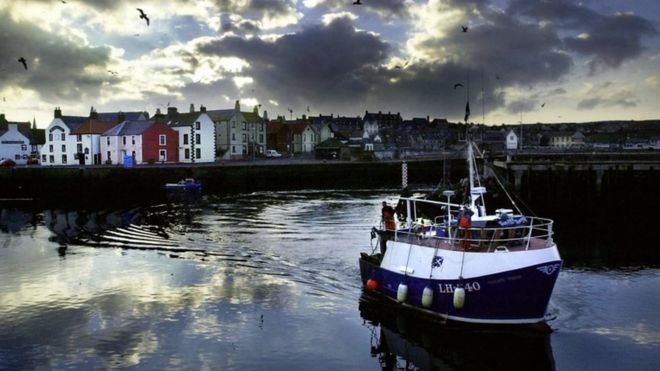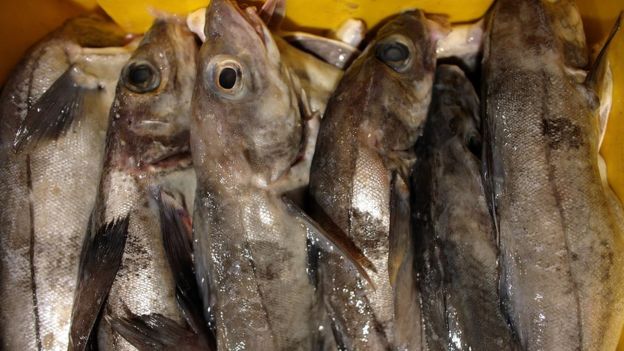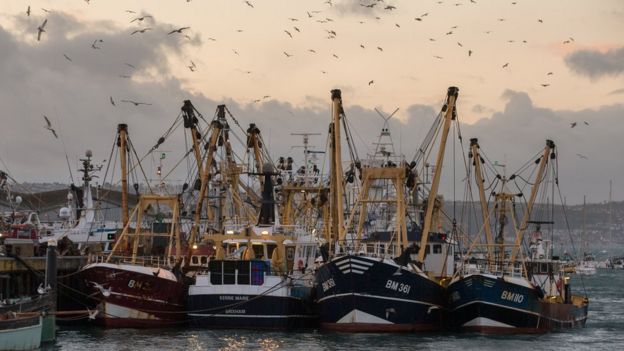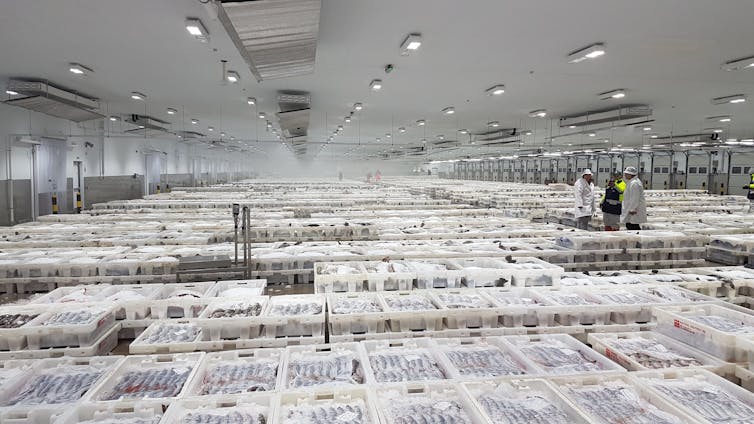Futures Forum: Sidmouth fishing film "Working the Sea" >>> tonight on BBC One's 'Inside Out'
The issue has also been central to the narratives around Brexit:
Brexit: Why is everyone talking about fishing?
 PA
PA
The fishing industry has found itself at the heart of the debate over Brexit and the prime minister's draft deal. But how did a sector which accounts for about 0.1% of the UK's economy become such a big issue?

Whale or minnow?
 GETTY IMAGES
GETTY IMAGES
A Commons research library briefing reckons the UK's fishing and fish processing industries employ a total of 24,000 people, and contribute £1.4bn to the UK economy. Yes, that's a lot of jobs and a lot of money. But it's a drop in the ocean when you consider that it's 0.12% of the overall economy, and less than 0.1% of the 33 million strong national workforce.
In terms of economic impact (measured by gross value added, or GVA), the timber industry has similar heft. Indeed, looking at the latest statistics for GVA by industry, almost all of them are bigger than fishing.
The leather goods industry is slightly larger - and given its reliance on European markets, could be as significantly affected by Brexit as fishing. Equally the travel agency industry is also watching political proceedings with interest, and is worth significantly more in GVA.
And yet, we don't hear backbench MPs fretting about the future of woodworking, or writing to the prime minister to demand a good deal for tanners. We don't even hear as regularly about the financial services industry, which is worth £119bn (or 6.5% of economic output).
So why does fishing have so much pull?

Local significance
 GETTY IMAGES
GETTY IMAGES
The difference between fishing and industries like wood processing can be found in their histories and its geographical concentrations. By and large, if you're going to go fishing, you need access to the sea. So the actual fish-catching infrastructure is packed into a few small areas - particularly in Scotland, which has 53% of the entire UK industry.
While it might make up a small sliver of the national workforce, the industry dominates some coastal communities in places like Peterhead. This means any changes in its fortunes have a very noticeable impact - similar to the way the downturn in the oil industry was particularly stark in Aberdeen.
The history of the fishing industry also gives it a firm hold on the heartstrings of a nation which up until quite recently claimed with some justification to "rule the waves".
On top of this, the industry has a powerful lobbying presence - Scottish Fishing Federation chief Bertie Armstrong has a keen eye for a media opportunity, and has become a more prominent figure in the current political debate than quite a few cabinet ministers.
Brexit: Why is everyone talking about fishing? - BBC News
A look at the national dailies from the last week shows how emotive an issue it is:
Brexit news: Gove sends STERN warning to Macron over Brexit fishing THREAT | UK | News | Express.co.uk
Fishermen ‘betrayed’ after Brexit talks on policy end in stalemate | Business | The Guardian
Today, Devon Live looks to Cornwall:
Brexit will not take back control of fishing industry, says Labour group
Blame successive UK governments, not the EU, for fact that one Dutch ship has a larger UK quota than entire Cornish fishing fleet, say South East Cornwall Labour group
- 21:28, 2 DEC 2018
A flotilla of fishing boats sailed out of Newlyn this evening to show their support for the Vote Leave campaign.(Image: Greg Martin)
One Dutch factory ship has a larger UK quota than entire Cornish fishing fleet - but this is not the fault of the EU - South East Cornwall Labour group has said.
In a statement released to the press today, the group's Energy and Environment Co-ordinator, Dr Patrick O'Sullivan has also cliamed Brexit will not enable the UK to 'take back control' of the fishing inudstry.
"With all the talk of ‘take back control’, ministers have the power to distribute UK quota now and put the under-ten fleet first. This does not need EU agreement, or exit from the Common Fisheries Policy. It could be done today," said Dr O'Sullivan.
"As Britain exports the majority of the fish that it catches and imports most of the fish that it eats, closing down UK waters to foreign boats may not be a simple matter, as access may well be used by the EU as a condition of any final Brexit negotiations.
"It is not so much the EU which is directly responsible for many of the foreign boats fishing in UK waters, but successive UK governments’ own policies of auctioning off leases for fishing quotas to the highest bidder.
"The real issue is that a greater proportion of UK fishing quota is owned by foreign businesses than of any other EU member state. Three companies (Andrew Marr Inc., Interfish, and the Cornelius Vrolijk, a Dutch factory ship) own over 66%. The Cornelius Vrolijk itself owns 23% of the English fishing quota – more than the entire Cornish fishing fleet. Since ‘under ten’ boats contribute 78% of the UK fishing workforce, it seems grossly unfair that they receive only 2-6% of the UK national fishing quota.
"Labour’s new environmental policy has been welcomed by local campaigners. The Green Transformation, announced at national conference in September, states that we will reconfigure funds for farming and fishing to support sustainable practices, smaller traders, local economies and community benefits, and establish a science innovation fund to promote the most sustainable forms of farming and fishing, with support for our small-scale fishing fleet.
"We will also review allocation of UK fishing quotas to promote the most sustainable fishing practices, to the benefit of coastal communities and the small-scale fishing fleet. This clearly demonstrates that Labour is not just a metropolitan party, and that we care for ‘the many’ small, coastal and other rural communities, not just for the urban ‘few’.
"Research by the New Economics Foundation has shown that thousands of new jobs could be created if UK fisheries policies were reformed in the way Labour suggests. Limiting catches to follow scientific advice would increase landings by 45%, translating into an additional Gross Value Added (GVA) of £150 million around the UK coastline. This would support an additional 5,390 full-time equivalent jobs in fishing and its allied and ancillary trades, and in the wider community."
Brexit will not take back control of fishing industry, says Labour group - Devon LiveHere's a well-measured piece from The Conversation:
Brexit: what the UK fishing industry wants
The fishing industry constitutes a small but powerful voice when it comes to Brexit negotiations. Who gets to fish in UK waters and how much they get to fish, as well as the UK fishing industry’s access to EU markets, have been front and centre of debates over the UK’s future relationship with the EU.
It’s widely recognised that the UK fishing industry voted for Brexit. The Common Fisheries Policy (CFP), which regulates fishing rights in the EU, is seen as a huge source of discontent among UK fishermen. But having interviewed key people in northeast Scotland’s fishing industry this summer, our conversations revealed a much more nuanced position on Brexit than is often portrayed in the media.
Perhaps most notably, some fishermen suggested that Brexit is not entirely about reversing the CFP, in the sense that foreign vessels should be banned from accessing UK fish stocks in UK waters. Rather, it is about the UK managing its own waters after Brexit more fairly than is possible within the CFP. There is an awareness that most UK fish exports are destined for EU markets and so maintaining a good working relationship is important. For example, one fisherman said:
I’m not also advocating that no foreign boat should be allowed in the UK, that would be wrong in my opinion. They have historical rights as well fishing our waters, it’s just the allocation of it.
Fair fishing for all
In fact, the CFP is credited with some positives, such as bringing in management rules that helped the industry survive. But most agree that the CFP is now a burden to the industry that imposes impractical rules like the discard ban and gives away a UK resource at the cost of the UK fishing industry. As one fisherman put it:
To me the Common Fisheries Policy has been a disastrous policy for the fishing industry round the UK. Okay, it’s conserved the stocks but it’s decimated the fishing communities round about the UK.

There is also an awareness of the possibility that the fishing industry ends up in a worse position, if negotiations with the EU go badly. What they want is for the UK government to provide a plan that ensures the future of their industry and their communities, while dealing fairly with fishermen from the EU, where a significant part of their business plan relies on access to UK waters.
This understanding of the potential plight of their fellow fishermen from Europe, were the UK waters to be closed to foreign vessels, is reflected in one person’s comments:
I do not think it is fair that on a vote of the UK that a man who has built up a business in Denmark, Holland, France all of a sudden loses out overnight. I think we should be man enough to say we’re changing the rules and we’re going to do it over a ten to 15-year period.
There is also concern that the current Brexit transition period leaves the fishing industry within the CFP while the UK has no say in its operation. But this is minor compared to the fear that the UK will leave the EU and remain in the CFP.
Little confidence in negotiations
Interviewees recognise that the fishing industry is of low economic importance to the UK and have little confidence in the negotiation. The largest concern is that, as part of the negotiations to withdraw from the EU, the fishing industry is used as leverage in wider trade negotiations and ends up in the same or a worse position. One person said:
It will just be a bargaining chip, the industry is nothing to the GDP in the UK, it’s less than 1%. Well, if you go to Denmark, you go to Holland, they all fight for their fishermen. France, Spain, you take the financial market in London, they’ll sacrifice the fishing industry to keep it.
The industry also cares about a future EU-UK trade deal, as the majority of fish products exported from the UK go to the EU. Currently, there are no tariffs or customs checks on these products. But there are concerns that tariffs on seafood exports would increase the price of their products which could reduce sales. Plus, any delays from customs checks would reduce the quality of the fresh produce as it increases the time between catching and arriving at supermarkets and restaurants on the continent. One fisherman summed up his concerns on trade and markets:
I think the main risk is our markets in Europe. I have a fear that there’s a closed-door there and we have a perishable commodity and we have lorries backing up at the channel and fish decreasing in quality, you know, that can hit the price in the market for us.
Clearly, there are fears over how things will pan out. The fishing industry voted for Brexit to escape the rules and regulations of the CFP, many of which are seen as troublesome at best. But the ongoing Brexit negotiations have provided no certainty or clarity to the fishing industry, which both fears its decline and hopes for an outcome that enables a renaissance in the UK’s coastal communities.
Brexit: what the UK fishing industry wants
.
.
.


No comments:
Post a Comment